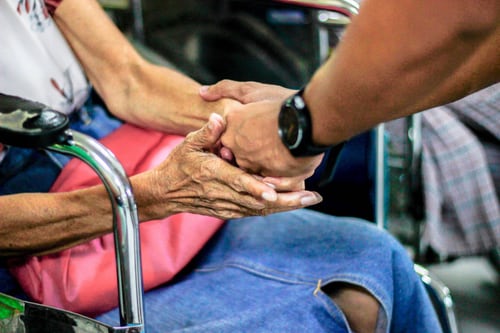Most of us have been given the gift of 5 senses: sight, smell, taste, hearing, and touch. These are the channels through which we experience the world, and connect with the world. And those senses are something to be truly thankful for.
Now which of our 5 senses, do you think, is the most important one?
It may surprise you that, from a developmental standpoint, TOUCH is often considered the most important of our senses. Our whole body is designed for greatest touchy-feely experience: the skin we’re in is our largest organ. Under every square INCH of our skin, there are about 1,000 nerve endings – you do the math what that means for our entire body. And each of these nerve endings is wired to our brain, where we register what those nerve endings are picking up on: the pleasurable and relaxing experience of a hot bath. A nice refreshing wind on a hot day. The comfy feel of our favorite sweater. But then also things that set off all the alarm bells in our brain, like discomfort and pain.
And have you ever noticed that we use the word ‘touch’ even in a more figurative sense when something really stirs our soul? ‘That is so touching,’ we say about a gesture that has nothing to do with physical contact. Even the Germans, who have a reputation of being rather reserved and stoic, say, ‘Das berührt mich.’
The first sensual experience we have – while we are still in our mother’s womb – is touch. In fact, the time in the womb is one long, loving embrace. That’s why it is so important that physical contact, touch, continues, right after birth and later on. On the Stanford Hospital educational website, you find the following statement, ‘Skin-to-skin time in the first hour helps regulate babies’ temperature, heart rate, and breathing, and helps them cry less. It also increases mothers’ relaxation hormones.’*
A lack of touch, especially in the early years, can have devastating consequences. An article from the U.S. National Institutes of Health’s National Library of Medicine** states: ‘Developmental delay is often seen in children receiving inadequate or inappropriate sensory stimulation. For example, orphaned infants exposed to the bleakest of conditions in eastern European institutions exhibited impaired growth and cognitive development, as well as an elevated incidence of serious infections and attachment disorders.’
It is scientifically proven: touch is important for young children. But no matter how old we are, we all benefit from touch, physically and mentally. Touch calms us down. Touch is good for body and soul.
Probably all of us have seen the horrendous images of the apartment building that collapsed a couple of days ago just outside Miami. And whenever they showed images of family and friends, anxiously waiting for news on their missing loved ones, what did we see? People holding on to each other in their desperation and grief. Feeling someone’s touch helps us make it through traumatic situations.
Many nurses and doctors, who have taken care of COVID-19 patients in hospitals, described how heartbreaking it was for them to witness the isolation of their patients. To witness how much people craved touch – beyond the utilitarian handling of caretakers. To witness how many people died without being cradled by a loved one, without having their hand held.
Most if not all of us craved physical contact and touch when the pandemic was more rampant in our part of the world. It hurt not to be able to hug our children, our grandchildren, our friends. A very special and important way to connect with others was missing. Thanks be to God that we now are able to touch those who mean something to us again, though still carefully and mindfully.
And at this point a disclaimer: touch can be inappropriate. Not everyone likes to be touched, especially by someone they don’t know or don’t know well enough. Stop touching someone when you sense they are uncomfortable with it. Even better: ask if it’s okay to touch someone…
Throughout the Old Testament, God is described as very sensual. God sees, God hears, God even smells – when Able brings his animal sacrifice, the smell is pleasing to God – but not so pleasing to Cain. God’s physical touch is rare, but it happens – remember the story of God wrestling with Jacob at the banks of the River Jabbok? God uses all senses to connect with creation, to connect with humanity.
In Jesus Christ, God shares fully in our sensual human experience. Embraced and sheltered in his mother’s womb, Jesus knows first-hand how important touch is for our wellbeing, how powerful it is. Has it ever occurred to you in how many of the healing stories we have in the gospels Jesus doesn’t only say something along the lines of, ‘Your faith has made you well,’ but also touches the people? Or: he lets people touch him.
Today’s dramatic gospel lesson tells about two touching miracles. Jesus is back on the ‘right side’ of the Sea of Galilee. And it seems people are just waiting for him. There is Jairus, a synagogue leader, whose young daughter is on the brink of death. And he begs Jesus to come and heal her – by laying hands on her, by touching her. Now isn’t that interesting?
It’s not only Jairus who’s been waiting for Jesus. There are crowds, we hear, pressing in on him, seeking his presence, his touch. And among them is a woman desperate for healing. She’s been hemorrhaging for 12 long years, she’s suffered as her life blood has been draining from her constantly, disrupting her life in all aspects, possibly keeping others from touching her. Nobody has been able to heal her. Jesus is her last chance. And she believes in the power of touch. ‘If I only touch his clothes, I will be made well…’
The miracle happens. The moment she touches Jesus, her bleeding stops. Now Jesus could leave it at that – someone touched me, they were healed, great, let’s move on, there’s a young girl who needs my healing touch now – but he stops. He takes the time to truly connect with this woman -who is quite terrified to realize that she’s been found out – to relate to her beyond that fleeting and casual brush. He takes the time to truly touch her. He reassures her and speaks to her tenderly and lovingly. ‘Daughter, child,’ he says, ‘Daughter, your faith has made you well; go in peace, and be healed of your disease.’
While all this is happening, people come to Jesus, telling him to not bother coming to the Jairus’ house anymore, because his daughter now has died. But Jesus goes anyway. He sends the crowds and the wailing women and even most of his disciples away and enters they place where the child is lying with his closest confidants – Peter, James, and John – and the girl’s grieving parents. What is about to happen is not supposed to be a spectacle. It’s an intimate and sensitive moment.
Jesus gently touches the child, he takes her by the hand, as he addresses her in a tender way similar to how he addressed the hemorrhaging woman, ‘Talitha – little girl – get up.’ His touch, his gentle yet powerful words, bring the child back to life. And I imagine there is a good reason the girl’s parents are in the room – Jesus releases her into the arms, the loving touch, of her mother and father. The healing can continue…
Here as in other moments, we experience Jesus as this God who is close – so close, in fact, that people are touched. So close, that the most important of the human senses is engaged and stimulated. God responds to our need, our craving for touch. And though Jesus Christ may not be with us in this physical way today, we still find hope and comfort in those stories, God’s longing to touch us, and the touching promises of God’s kingdom, as we find it at the end of the Book of Revelation, for example: and God will wipe away every tear from our eyes…
And today we are here. Called the body of Christ, called to be the body of Christ on earth today. We may not have the miraculous healing powers of Jesus Christ. But we shouldn’t underestimate how powerful our touch can be – the holding of a hand, an encouraging and heartfelt hug when it is needed – how our touch can fulfill longing that was instilled in us already in our mother’s womb. How our touch can heal.
God gave us our 5 senses, for our enjoyment, and to connect with God’s amazing creation all round us – but also to use them in service to others. Amen
* https://med.stanford.edu/news/all-news/2013/09/the-benefits-of-touch-for-babies-parents.html
** https://www.ncbi.nlm.nih.gov/pmc/articles/PMC2865952/
This post is also available in: German





